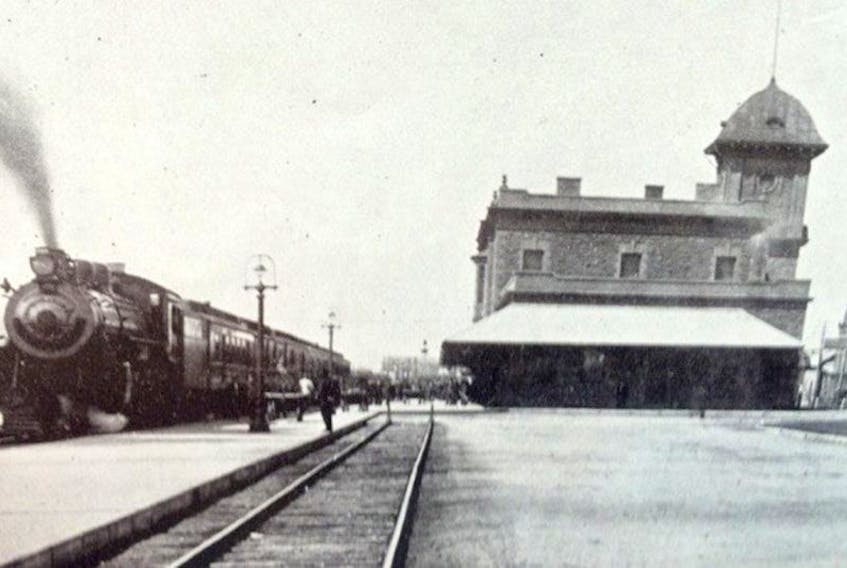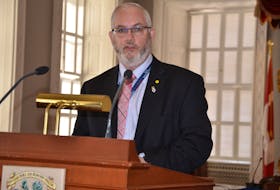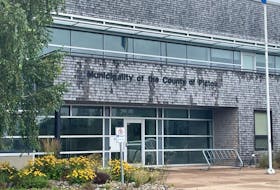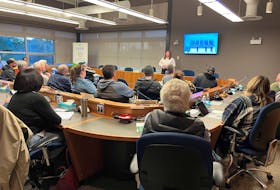“A lot of people think Boston saved Halifax,” she said. “There was a lot of help from there, in part because so many Nova Scotians were there, but I hate to see it obscuring the fact that it was Nova Scotians who were there first.”
Maybee was doing research in the Colchester Historeum archives when she came across unpublished material about the help Truro provided.
“I thought, ‘My goodness, this is amazing!’” she said. “Within an hour of hearing what had happened Truro sent the first train with doctors, nurses and firemen.”
After the railway telegraph sent a message about the explosion A.R. Coffin, who owned the paper at that time, got the news out by placing a bulletin outside the office. He contacted Mayor Dunbar, who organized a group of medical people and firemen who headed down that day. Coffin hired a taxi and travelled to the city, where he offered papers the use of his printing press.
Truro was the only Nova Scotia community outside Halifax with a relief committee and, because there was no hospital in the town at that time, they set up emergency hospitals at the fire hall, academy and courthouse. They were ready for the injured when the train arrived. This was two days before help arrived from Boston.
People from across Colchester County donated food, clothing and money. Children from a school in Earltown put their money together and donated $10.
“There’s surprisingly little known about this so when I was asked by SCANS to do a presentation I thought this should be the subject,” said Maybee. “It’s high time we talk about it.”
Maybee is a research associate at the Maritime Museum of the Atlantic and author of ‘Aftershock: The Halifax Explosion and the Persecution of Pilot Francis Mackey.’ She will be speaking at Edinburgh Hall, Parkland (356 Young St.) on Feb. 17 from 10 a.m. to noon. Parking is available at Shannex. If there is a storm the lecture will be rescheduled to Feb. 24
People are asked not to wear any scents. The event is free but donations to SCANS (Seniors College Association of Nova Scotia) will be accepted. SCANS is a non-profit organization dedicated to providing non-credit academic courses to Nova Scotians at least 50 years of age.
“A lot of people think Boston saved Halifax,” she said. “There was a lot of help from there, in part because so many Nova Scotians were there, but I hate to see it obscuring the fact that it was Nova Scotians who were there first.”
Maybee was doing research in the Colchester Historeum archives when she came across unpublished material about the help Truro provided.
“I thought, ‘My goodness, this is amazing!’” she said. “Within an hour of hearing what had happened Truro sent the first train with doctors, nurses and firemen.”
After the railway telegraph sent a message about the explosion A.R. Coffin, who owned the paper at that time, got the news out by placing a bulletin outside the office. He contacted Mayor Dunbar, who organized a group of medical people and firemen who headed down that day. Coffin hired a taxi and travelled to the city, where he offered papers the use of his printing press.
Truro was the only Nova Scotia community outside Halifax with a relief committee and, because there was no hospital in the town at that time, they set up emergency hospitals at the fire hall, academy and courthouse. They were ready for the injured when the train arrived. This was two days before help arrived from Boston.
People from across Colchester County donated food, clothing and money. Children from a school in Earltown put their money together and donated $10.
“There’s surprisingly little known about this so when I was asked by SCANS to do a presentation I thought this should be the subject,” said Maybee. “It’s high time we talk about it.”
Maybee is a research associate at the Maritime Museum of the Atlantic and author of ‘Aftershock: The Halifax Explosion and the Persecution of Pilot Francis Mackey.’ She will be speaking at Edinburgh Hall, Parkland (356 Young St.) on Feb. 17 from 10 a.m. to noon. Parking is available at Shannex. If there is a storm the lecture will be rescheduled to Feb. 24
People are asked not to wear any scents. The event is free but donations to SCANS (Seniors College Association of Nova Scotia) will be accepted. SCANS is a non-profit organization dedicated to providing non-credit academic courses to Nova Scotians at least 50 years of age.









